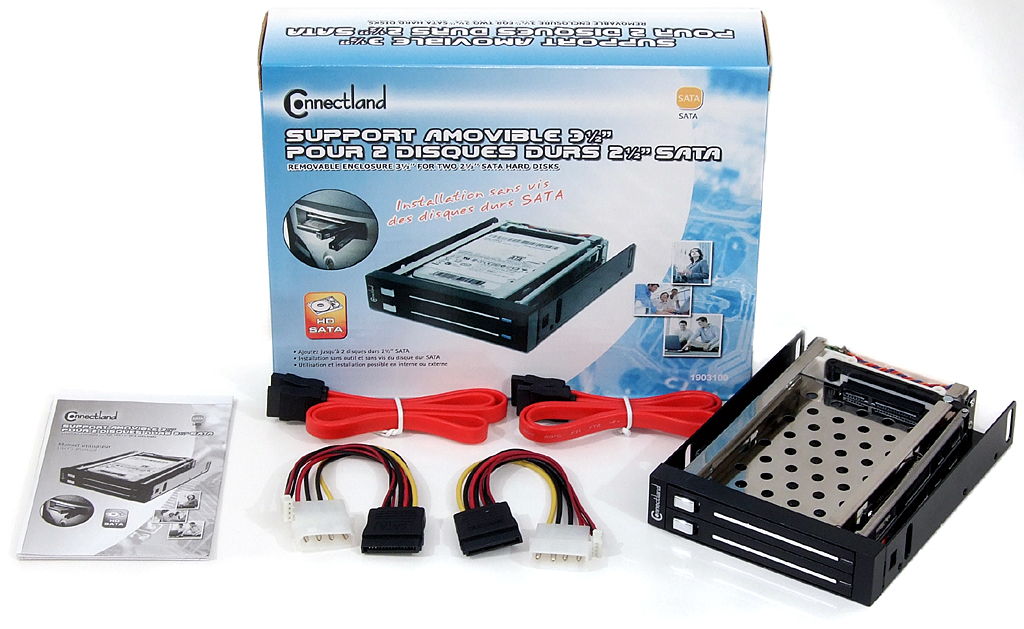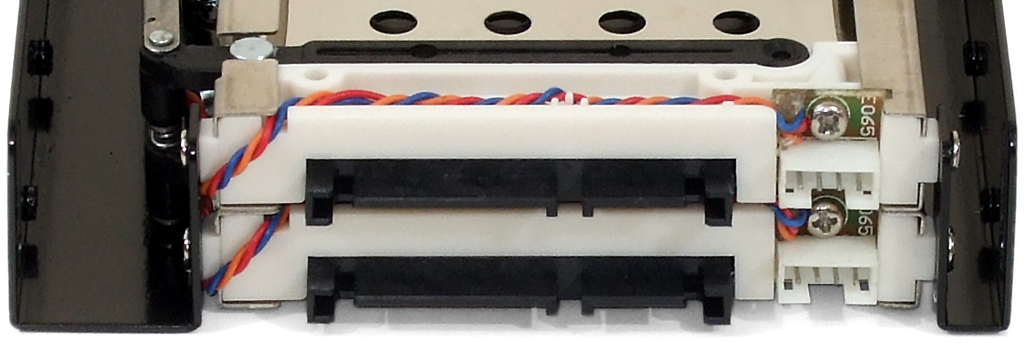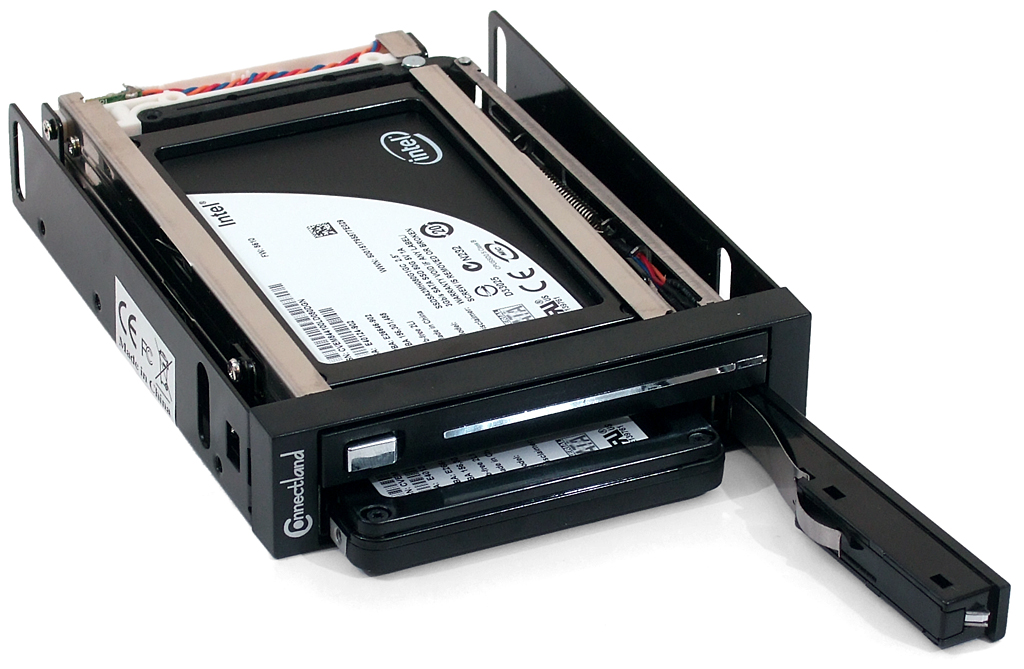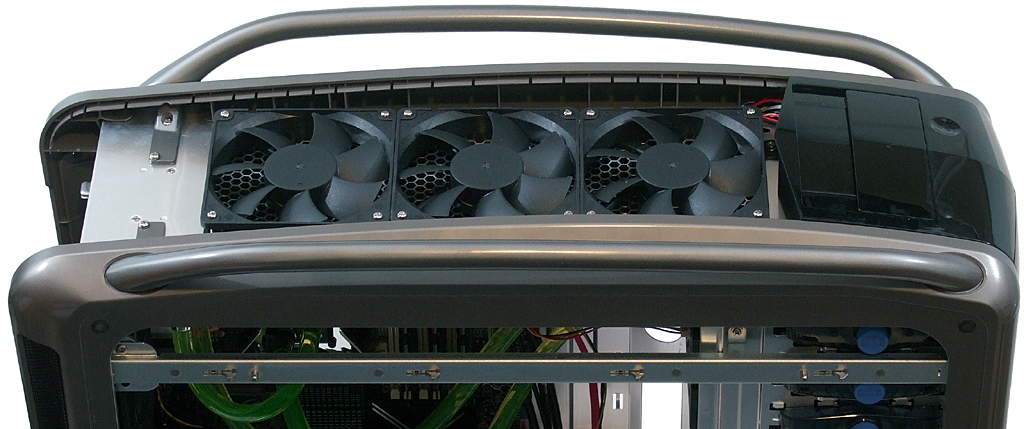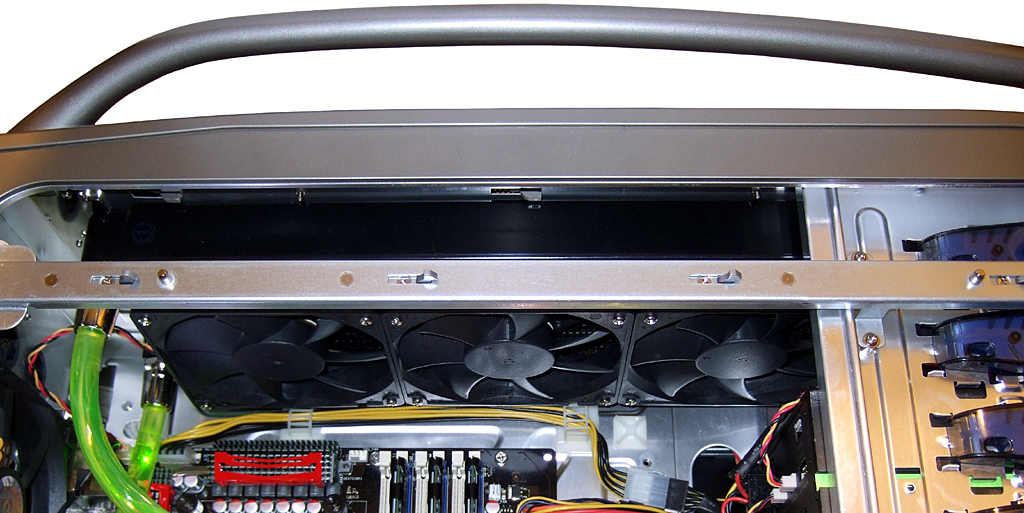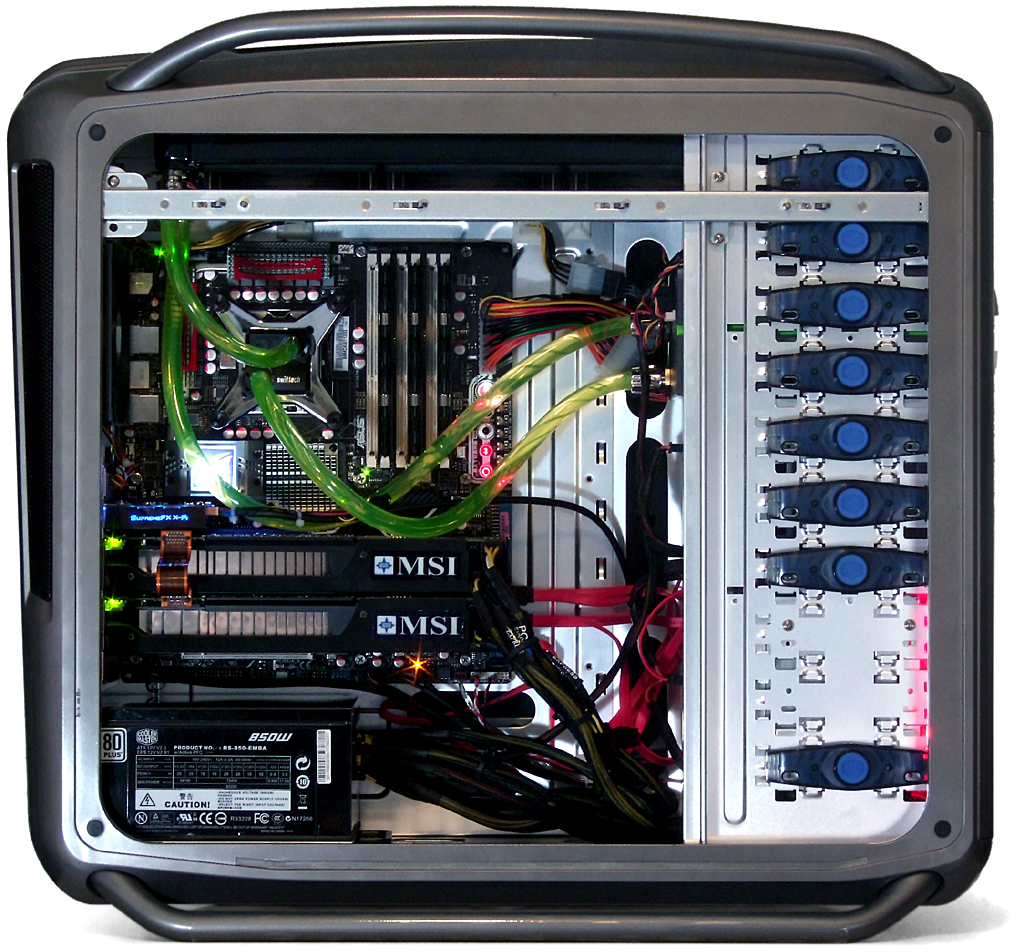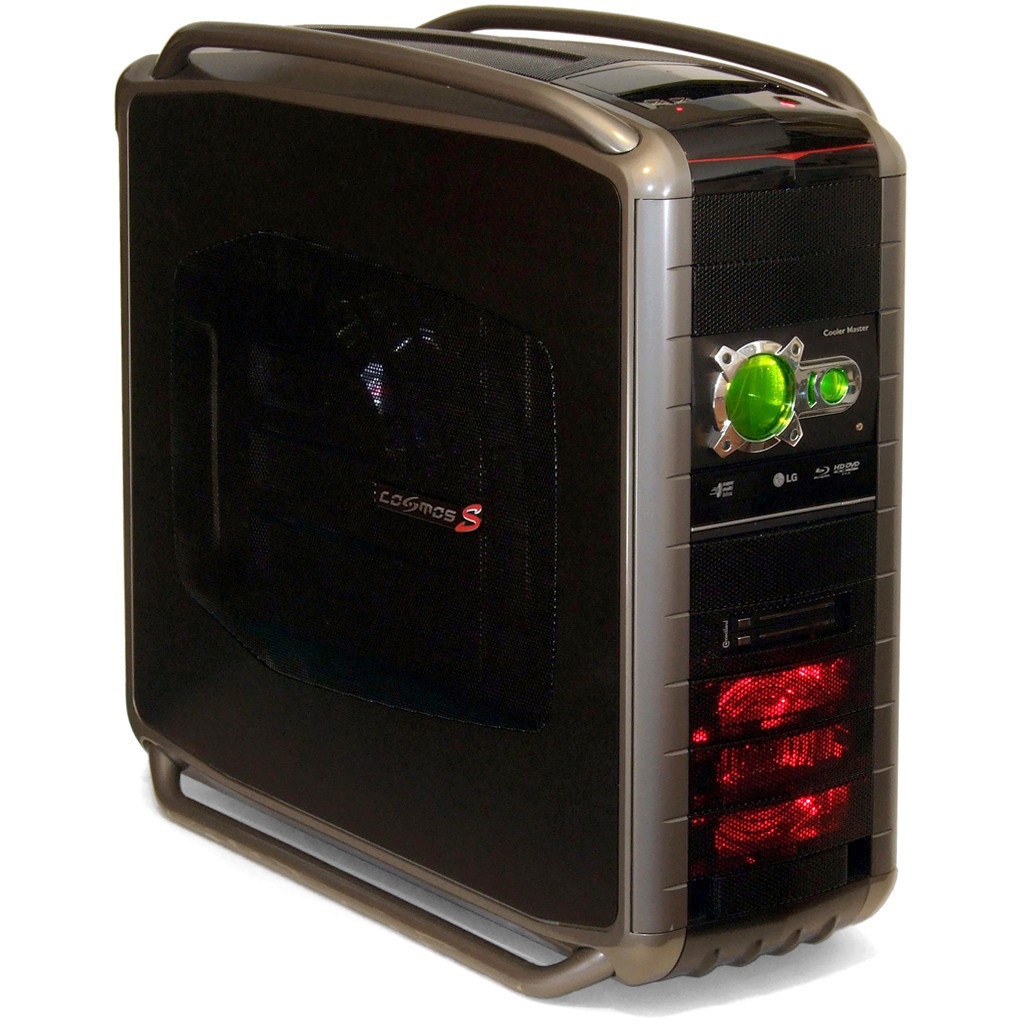System Builder Marathon: The $5,000 Extreme PC
Accessories And Installation
Because our $5,000 system used two 2.5” form-factor SSD hard drives, we needed at a minimum two 3.5” bay adapters, at a minimum cost of $10 each. The thought of paying $20 or more for a few crude brackets spelled “rip off” in this editor’s mind, especially when a far more elegant solution could be had for $36.
Newegg calls this type of device a "mobile rack," but the term “mobile” is most likely carried over from earlier designs that mounted the hard drive in a tote box with a handle. Alternatively, this device could be called a “hot-swap drive cage” or a “SATA backplane,” although these names are typically only applied to devices that support three or more drives for advanced RAID arrays.
Two adapters are required to connect the SYBA CL-HD-MRDU25S rack’s LED activity indicators, but we instead configured our system using standard cables. The activity light of the Cooler Master Cosmos S provides the same information without the sloppy wiring.
An ejection lever automatically disengages each drive when its access door is open, making the installation and removal of 9.5 mm tall drives a simple operation.
Buyers should be aware that the 2.5” SATA form factor is standardized so that 2.5” SSD devices follow it. Specially-labeled “SSD Adapters” are not required, although labeling a standard adapter as SSD-optimized sounds like a good way for sellers to collect a “sucker tax.”
Cooler Master designed space into its Cosmos S for installing fans between the top trim panel and the top of the aluminum chassis. Mounting intake fans here allows cool air to be blown downward through the radiator. This is the method that liquid-cooling expert Koolance favors, even though it works against convective flow of the case. We tried it, and found it was too noisy.
Mounting the fans on the bottom blows warm case air up through the radiator, but this also improves airflow inside the case. The cooling of other internal components improves, with the added benefit of significant noise reduction. Choosing this configuration increased the temperature of our heavily overclocked Core i7 965 processor by around 0.5 degrees Celsius, which we feel is a reasonable trade-off for remarkably decreased noise with marginally lower case temperatures.
Get Tom's Hardware's best news and in-depth reviews, straight to your inbox.
The Swiftech MCR320-QP radiator doesn’t include hose barbs, so we re-used fittings from the Cooler Master Aquagate Max radiator.
Because the liquid cooling system was empty, we attached the Apogee GTZ water block onto the Asus Rampage II Extreme prior to motherboard installation. Coolant lines were then cut to length, joining the Aquagate Max pump and reservoir assembly with remaining components.
With the liquid cooling components installed, we inserted the LG GGW-H20LK Blu-ray Burner, the SYBA CL-HD-MRDU25S rack with its twin Intel X25-M 80 GB drives, the Seagate ST31500341AS 1.5 TB storage drive, and the Cooler Master RS-850-EMBA power supply.
Once we had the case, hard drive, and motherboard power cables connected, we inserted two MSI N295GTX-M2D1792 graphics cards to complete our quad-SLI configuration.
We dropped the radiator below the Aquagate Max pump and reservoir to allow air to be purged while filling the liquid-cooling system. The radiator was detached from the top panel by removing four screws and was repositioned once air had been removed.
Few problems slowed our build progress, but one particular annoyance was that the Aquagate Max pump assembly didn’t quite fit into its bays. Tabs protruding from the sides of the bays are meant to keep drives positioned horizontally during installation, but the pump assembly’s casing was just a little taller than the spacing of those tabs. We had to slightly bend four of the tabs to compensate.
A less annoying issue was that the 5.25”-to-3.5”-adapter brackets that Cooler Master included with its case were too narrow to fit snuggly into the larger bay when attached to the SYBA CL-HD-MRDU25S rack. That prevented the screw-less drive-lock mechanism from functioning properly, forcing us to use screws instead.
-
xx12amanxx Nice article!Reply
I wish i could own a rig like that,but it would be that or a 383 stroker for the F-body..lol I can dream cant I? -
Crashman xx12amanxxNice article!I wish i could own a rig like that,but it would be that or a 383 stroker for the F-body..lol I can dream cant I?Reply
383 strokers are for copycats. Basically, too many bad 400 blocks and people found a cheap way to re-use the cranks to make their 350's bigger. If you have THIS kind of money, you'd might as well go BIG BORE too. Maybe a bowtie block? At any rate, you'll win more races with a real 400 (or larger custom size) so long as the block is good. -
one-shot It is interesting to note on Page 14. On the Sandra XII Multimedia test the Core i7 965 @ 4.2GHz scored 486,971, while the i7 920 @ 4.0GHz scored 386,867. The difference was 200MHz and made such a large difference. Did the Intel SSDs influence such a large gain in performance or the DDR3 @ 1800MHz or perhaps a combination of both?Reply -
Crashman Reply9469314 said:It is interesting to note on Page 14. On the Sandra XII Multimedia test the Core i7 965 @ 4.2GHz scored 486,971, while the i7 920 @ 4.0GHz scored 386,867. The difference was 200MHz and made such a large difference. Did the Intel SSDs influence such a large gain in performance or the DDR3 @ 1800MHz or perhaps a combination of both?
The 965 has a higher-bandwidth QPI link, so it should be good for boosting at least a few synthetic scores. -
gim159 BAH!! Why is it always Intel? Only Servers and people that wish they MAC should use Intel stuffs.. Who else is going to use all of it's features? Not gamers, that is for sure!! Like a gamer is going to spend the extra $$ for ECC memory and not spend it on more important stuff like a GC or a great board. That and an economy minded PC buyer will go AMD anytime, more bang for the buck...Reply
Also, Ati is better a better card, for linking I mean. The support may be crap, but it is usually worth it to get them! 4850 X2, Water cool one and watch the clock go through the roof! -
xx12amanxx Intel is the fastest thats why...This is supposed to be an uber rig.Reply
Ya crashman thats the problem i dont have that kind of money..lol A fresh stock rebuild bolt on's and spray will have to hold me off until better times! -
gim159 Yeah, Optimize the heck out of it and take all of the unnecessary stuff out.. Probably 4 sec boot, Awesome!Reply -
Crashman xx12amanxxIntel is the fastest thats why...This is supposed to be an uber rig.Ya crashman thats the problem i dont have that kind of money..lol A fresh stock rebuild bolt on's and spray will have to hold me off until better times!Reply
I spec'd out a friend's 406 C.I. mouse a few years ago and he got through under $4500 with aluminum heads and a roller cam!

